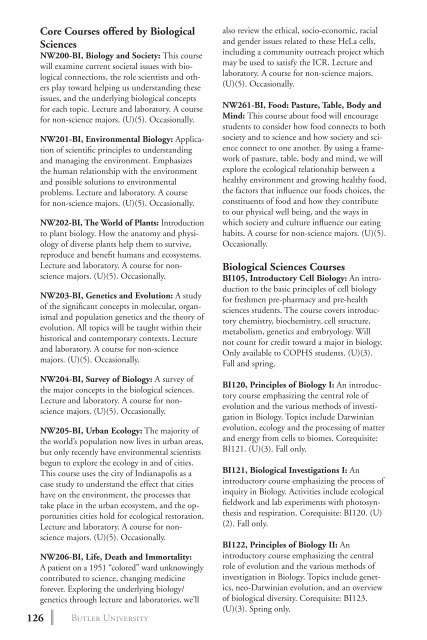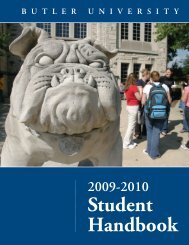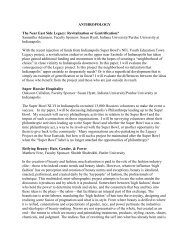2 0 1 3 bulletin - Butler University
2 0 1 3 bulletin - Butler University
2 0 1 3 bulletin - Butler University
You also want an ePaper? Increase the reach of your titles
YUMPU automatically turns print PDFs into web optimized ePapers that Google loves.
126<br />
Core Courses offered by Biological<br />
Sciences<br />
NW200-BI, Biology and Society: This course<br />
will examine current societal issues with biological<br />
connections, the role scientists and others<br />
play toward helping us understanding these<br />
issues, and the underlying biological concepts<br />
for each topic. Lecture and laboratory. A course<br />
for non-science majors. (U)(5). Occasionally.<br />
NW201-BI, Environmental Biology: Application<br />
of scientific principles to understanding<br />
and managing the environment. Emphasizes<br />
the human relationship with the environment<br />
and possible solutions to environmental<br />
problems. Lecture and laboratory. A course<br />
for non-science majors. (U)(5). Occasionally.<br />
NW202-BI, The World of Plants: Introduction<br />
to plant biology. How the anatomy and physiology<br />
of diverse plants help them to survive,<br />
reproduce and benefit humans and ecosystems.<br />
Lecture and laboratory. A course for nonscience<br />
majors. (U)(5). Occasionally.<br />
NW203-BI, Genetics and Evolution: A study<br />
of the significant concepts in molecular, organismal<br />
and population genetics and the theory of<br />
evolution. All topics will be taught within their<br />
historical and contemporary contexts. Lecture<br />
and laboratory. A course for non-science<br />
majors. (U)(5). Occasionally.<br />
NW204-BI, Survey of Biology: A survey of<br />
the major concepts in the biological sciences.<br />
Lecture and laboratory. A course for nonscience<br />
majors. (U)(5). Occasionally.<br />
NW205-BI, Urban Ecology: The majority of<br />
the world’s population now lives in urban areas,<br />
but only recently have environmental scientists<br />
begun to explore the ecology in and of cities.<br />
This course uses the city of Indianapolis as a<br />
case study to understand the effect that cities<br />
have on the environment, the processes that<br />
take place in the urban ecosystem, and the opportunities<br />
cities hold for ecological restoration.<br />
Lecture and laboratory. A course for nonscience<br />
majors. (U)(5). Occasionally.<br />
NW206-BI, Life, Death and Immortality:<br />
A patient on a 1951 “colored” ward unknowingly<br />
contributed to science, changing medicine<br />
forever. Exploring the underlying biology/<br />
genetics through lecture and laboratories, we’ll<br />
<strong>Butler</strong> <strong>University</strong><br />
also review the ethical, socio-economic, racial<br />
and gender issues related to these HeLa cells,<br />
including a community outreach project which<br />
may be used to satisfy the ICR. Lecture and<br />
laboratory. A course for non-science majors.<br />
(U)(5). Occasionally.<br />
NW261-BI, Food: Pasture, Table, Body and<br />
Mind: This course about food will encourage<br />
students to consider how food connects to both<br />
society and to science and how society and science<br />
connect to one another. By using a framework<br />
of pasture, table, body and mind, we will<br />
explore the ecological relationship between a<br />
healthy environment and growing healthy food,<br />
the factors that influence our foods choices, the<br />
constituents of food and how they contribute<br />
to our physical well being, and the ways in<br />
which society and culture influence our eating<br />
habits. A course for non-science majors. (U)(5).<br />
Occasionally.<br />
Biological Sciences Courses<br />
BI105, Introductory Cell Biology: An introduction<br />
to the basic principles of cell biology<br />
for freshmen pre-pharmacy and pre-health<br />
sciences students. The course covers introductory<br />
chemistry, biochemistry, cell structure,<br />
metabolism, genetics and embryology. Will<br />
not count for credit toward a major in biology.<br />
Only available to COPHS students. (U)(3).<br />
Fall and spring.<br />
BI120, Principles of Biology I: An introductory<br />
course emphasizing the central role of<br />
evolution and the various methods of investigation<br />
in Biology. Topics include Darwinian<br />
evolution, ecology and the processing of matter<br />
and energy from cells to biomes. Corequisite:<br />
BI121. (U)(3). Fall only.<br />
BI121, Biological Investigations I: An<br />
introductory course emphasizing the process of<br />
inquiry in Biology. Activities include ecological<br />
fieldwork and lab experiments with photosynthesis<br />
and respiration. Corequisite: BI120. (U)<br />
(2). Fall only.<br />
BI122, Principles of Biology II: An<br />
introductory course emphasizing the central<br />
role of evolution and the various methods of<br />
investigation in Biology. Topics include genetics,<br />
neo-Darwinian evolution, and an overview<br />
of biological diversity. Corequisite: BI123.<br />
(U)(3). Spring only.
















